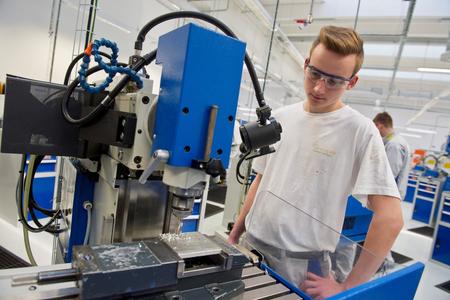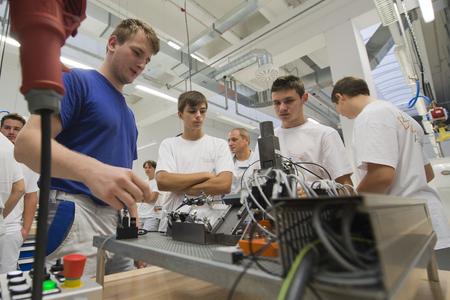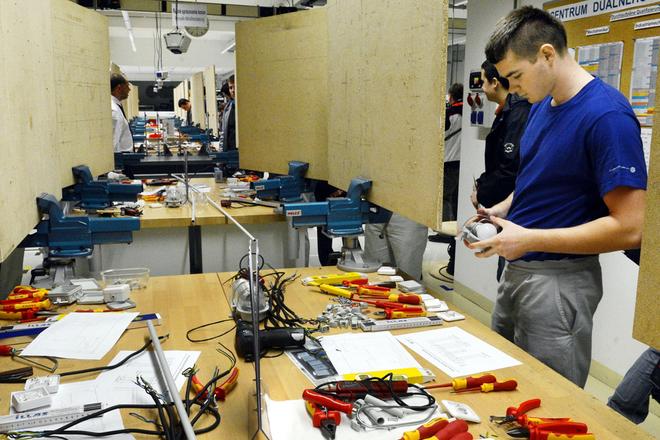A shortage of qualified workforce is one of the main negatives of the Slovak labour market. Companies are trying to solve this problem by training their own staff in dual education programmes.
“One of the strategic problems of the further development of the automotive industry is the lack of qualified labour,” Juraj Sinay, president of the Association of Automotive Industry (ZAP), said at a press conference in February 2017.
Dual education controls the fluctuation on the job market. It also lowers the costs of employers for recruitment and requalification as they can prepare employees according to the needs of a particular industry.
The number of companies offering dual education options is increasing each year. A student signs a contract with an employer, who has an agreement on dual education with a school. The student receives theoretical education at the school and practical training at the employer.
“One of the main benefits is the fact that the student takes part in the practical training directly in the operation at the employer,” said Martina Pavliková, spokesperson of the state rail infrastructure operator Železnice SR (ŽSR).
Based on the statistics of the Education Ministry, the largest number of student contracts for the school term 2016/2017 was signed in machinery and metal processing (636), electro technologies (210), and economics and organisation, trade and services (118).
Geographically, the largest number of students involved in dual education is in Žilina Region (297), followed by Trenčín Region (194), Bratislava Region (171) and Nitra Region (168). The lowest number is in Prešov Region, with only 50 contracts.
“In Slovakia, the dual system of education is presented only in connection with manual occupations,” said Július Hron, chairperson of the education commission of ZAP, adding that the trend should move to other industries as well.
Driven by the automotive
The most active employer in dual education in Slovakia is currently Volkswagen Slovakia, which proves the dominance of the automotive industry. The company views the system of dual education positively as it enables companies to acquire qualified workers immediately upon completing their studies.
“We support it [dual education] also from the perspective of the lack of a qualified workforce in Slovakia,” said Lucia Kovarovič-Makayová, spokesperson of Volkswagen Slovakia.
In September 2016 Volkswagen Slovakia, together with partners Matador, Siemens and Bratislava Region, opened the Dual Academy in Bratislava.
“In the past we needed many welders; currently there is high demand for qualified workers who can operate the robots,” said Kovarovič-Makayová.
More than two-thirds of the education is practical training, including working directly in the Volkswagen manufacturing plant with the technologies.

The education is free and the company contributes to the accommodation, transport and food of the students.
“They can also get a company scholarship, bonuses for good work productivity and other benefits of dual education,” specified Kovarovič-Makayová.
Upon graduation, the students get a vocational diploma, a certificate of full secondary education – called maturita in Slovak – and an internationally valid certificate of expertise.
“They also have a job placement at the selected employer,” said Kovarovič-Makayová.
Another carmaker, Kia Motors Slovakia, entered the first terms of dual education in 2016.
“We will continue the dual education system also for the 2017/2018 term, in cooperation with the technical school of mechanical engineering in Kysucké Nové Mesto,” said Juraj Hammer from the department of training and education at Kia Motors.
Kia offers three study programmes: mechanical engineering specialist, programmer of cutting and welding machines, and mechatronics engineer.
Know your employees
Dual education programmes are also available in food and service industries. Supermarket chain Lidl plans to open training programmes at eight schools in Slovakia as of September 2017. Moreover, about 20 out of the 128 Billa supermarkets in Slovakia are already certified for dual education.
“The interest in the retail sector is not high but it is improving with the cooperation of other employers,” said Richard Havrila, HR manager of REWE group Slovakia that operates Billa supermarkets, who sees dual education as an opportunity for personal development of the employees who train them. “Gradually, we will certify further operations every year and also be ready for accepting more students into the first grade.”
Practical training at the employer provides the students with the company culture. This cuts the adaptation period when the students enter the work, which lowers the costs of business operations.

“A big advantage is also the acquisition of professional competence before actual completion of studies,” said Pavliková of ŽSR.
Tatry Mountain Resorts (TMR), operator of mountain resorts and provider of tourism services, is also preparing students in the dual education programmes. Seven hotels from the TMR group have entered the scheme of dual education.
“It creates conditions for the further development of the company,” Zuzana Fabianová, spokesperson of TMR, told The Slovak Spectator, adding that it is better prepared to react to the increasing requirements of the customers, which is a competitive advantage in this sector of business.
“TMR puts stress on building relationships with secondary schools and universities, so that it can effectively create sources of qualified and highly professional employees,” said Fabianová.
Since September 2016, 18 students from the hotel school in Liptovský Mikuláš have been involved in the scheme of dual education at the company. In September 2017, the overall number of students will increase to 54, expanding the programme to the hotel school in Kežmarok as well.
“The students see how we work, they are confronted with the highest quality standards from the beginning and they have access to good equipment and the latest technologies in the industry,” explained HR manager of TMR Marek Schwarz.
Focus on practice
Implementation of dual education is demanding on time and legislative, therefore it is important to motivate the people at the company and give them clear information about their duties in the dual education process.
“They take over the responsibility of the practical training for the entire length of the study,” said Fabianová.
Hammer considers the system of dual education a positive step towards interconnection of education and practical training in companies.
“The opportunity to train qualified workforce for the company, where there is currently a lack of such, is an interesting aspect among the sphere of employers,” he said.
He pointed out that the main disadvantage of dual education is low participation of the state in the system. Companies must put great effort in promoting the new educational system among the public.
“First, we would welcome systemic changes on the part of the state, that would make the system of dual education more attractive and known,” said Hammer. “Also in cooperation with other entrepreneurial entities and professional organisations we expect creation of favourable conditions for its stabilisation and further development.”
Currently, there is space for improvement in the educational plans, update of the curricula and creation of better conditions for the training of masters of vocational training.
“We put focus on the practical preparation, which now covers 70 percent of the education,” explained Kovarovič-Makayová. “In the future we would welcome the system of dual education also at the level of university education.”
Havrila calls for more flexibility but also for stricter assessment criteria for students, so that they feel that they earn their marks. Moreover, the system of grading should be unified across the whole system.
Pavliková of ŽSR sees as another drawback in the low information awareness not only of parents but also of companies, educational consultants and students about the availability of dual education. Thus, it is up to the employers to promote dual education at schools and various events that focus on professional education.
“Often students find out about the benefits of dual education too late and they cannot enter as it is not enabled by the law,” said Pavlíková.
“Definitely, dual education in this form is still a novelty for the education sector and the employers and not all the processes are set up properly,” Havrila said. “Yet it is improving and we are fixing the shortcomings.”



 Illustrative stock photo (source: TASR)
Illustrative stock photo (source: TASR)